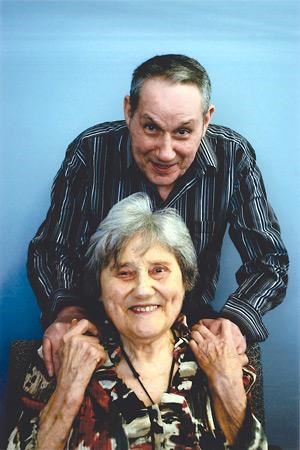A trained nurse, Mona Hawkins married her husband Bert in 1947. Their first son Robert arrived the next September.
“When he was born, he had the cord around his neck which cut off oxygen to his brain,” explained Mona, 93. “They didn’t have all the equipment to monitor babies then.”
Robert was a happy baby and young child but was removed from grade one because the school principal said he was too disruptive in the classroom.
“I wrote to Victoria and got the information to teach him at home,” said Mona. “He can read very well but is not so good at math. I hired a math teacher to help him learn to count to 100 and to deal with coins.”
At that time parents were advised to send their children with intellectual challenges to Woodlands School in New Westminster. Robert was at the institution for a time and also attended a training centre in Ladner.
“Then we brought him home,” explained Mona. “We didn’t like having him far away.”
Mona and Bert were among the group of parents who banded together to provide help to each other and work toward the desire to have an education for their children. Along with Jean Pike and Dave Pike, Jack and Anita Tremblay and Robbie Robertson, and others, they started meeting in the Pikes’ living room to work at overcoming the lack of resources available to them. Two years later, they formed a society, which has gone through a number of different names over 60 years, most recently becoming inclusion Powell River. Name changes reflect differing attitudes over the decades.
“Our first presidents were doctors,” said Mona, “and then Jack Tremblay was elected president and served for a long time.”
Education for their children started with volunteer teachers, first at Dwight Hall, then Westview Annex before moving to Cranberry Village Hall. The hall was no longer used after amalgamation in 1955 of Wildwood, Westview, Townsite and Cranberry. In 1962, Powell River’s school district assumed responsibility for providing special education.
Mona was society secretary for 30 years and still attends annual general meetings of inclusion Powell River. “I think I ask too many questions about how much money is being spent.”
Money was always a concern for the society. “We never had much and what we had was raised through raffles and bake sales,” said Mona.
It was only after Gerry Gray joined the society that more money was raised, she added. “His wife Kay started the Christmas Card Fund in the newspaper so that people could send their greetings that way and donate money they would have spent on cards and stamps to the association.”
Gray was a driving force in the building of Artaban Training Centre, now Community Living Place. “It required a lot of money at the time but it happened,” said Mona, “and it provided a place for our children, who were growing into adulthood, to attend and work at building furniture and doing crafts.”
Mona moved into Kiwanis Garden Manor eight years ago after living alone for four years after Bert died.
Photos of Robert and his younger brother Gary, a grade 12 chemistry teacher who lives in the Lower Mainland, decorate the walls and furniture.
Currently Robert lives in one of inclusion Powell River’s group homes where he enjoys helping in the kitchen. “Making brownies is one of his favourites.”
He comes every Wednesday to have dinner with his mother. “He loves to go around talking to people and knows everyone’s name. If someone is new, he asks their name once and then remembers it the next time.”
Mother and son also enjoy going out for lunch. Now that she no longer drives, Mona picks up Robert in a taxi and they head off to a restaurant.
Robert loves angels and gives them to his mother for gifts. He’s also painted a winter scene that hangs on her apartment wall and loved to draw when his hands were steadier. Robert learned how to square dance and Mona was frequently his partner. He also bowls and enjoys attending different functions through the association.
He sings and plays the keyboard. “I had someone teach him for a while until we figured out he could play by ear.” His favourite reading material is National Geographic magazines. “He leads his own life,” said Mona with pride.
She looks back on all the years of struggle for her and so many other parents, and says it was all worthwhile.
“Today they [children with intellectual challenges] are doing a lot more than they used to. They are educated along with others in the same classroom and they receive job training so they can work when they are older. It’s so much better now and there is help for parents.”
Part of the inclusion Powell River 60th anniversary project is a book on its history. Written by Timothy Balzar, it will be published later this year. The book provides a comprehensive look at six decades of an association that has been a leader advocating for change in society’s approach to people with intellectual challenges.



